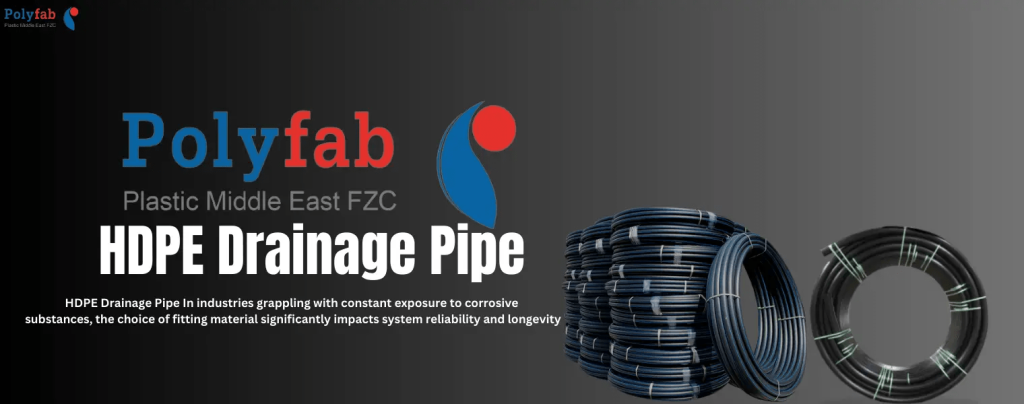
HDPE Drainage Pipe
HDPE Drainage Pipe In industries grappling with constant exposure to corrosive substances, the choice of fitting material significantly impacts system reliability and longevity. High-density polyethylene fittings emerge as champions, offering exceptional resistance to a wide range of chemicals, including acids, bases, and solvents. This remarkable characteristic makes them the ideal choice for various applications where chemical exposure is a concern. Pipes & Fittings’ exceptional chemical resistance is one of their most notable features. Because of its inert qualities, can resist being exposed to a variety of corrosive substances without degrading chemically. HDPE Pipes & Fittings act as an impermeable barrier to safeguard the integrity of fluid handling systems and guarantee dependable and safe operation, regardless of the strength of the acids, alkaline solutions, or harsh solvents. A strong thermoplastic called High-Density Polyethylene serves as the foundation for many fluid handling systems. This adaptable material, when molded or fabricated into HDPE pipes and fittings, guarantees system integrity and performance in a variety of applications. HDPE pipes and fittings, particularly drainage pipes, excel in strength, durability, and dependability in a variety of applications, including chemical processing,
Understanding HDPE Fittings:
A strong thermoplastic called High-Density Polyethylene serves as the foundation for many fluid handling systems. This adaptable material, when molded or fabricated into HDPE pipes and fittings, guarantees system integrity and performance in a variety of applications. particularly drainage pipes, excel in strength, durability, and dependability in a variety of applications, including chemical processing, HDPE Pipes & Fittings’ exceptional chemical resistance is one of their most notable features. Because of its inert qualities, HDPE can resist being exposed to a variety of corrosive substances without degrading chemically. HDPE Pipes & Fittings act as an impermeable barrier to safeguard the integrity of fluid handling systems and guarantee dependable and safe operation, regardless of the strength of the acids, alkaline solutions, or harsh solvents. HDPE Pipes & Fittings’ exceptional chemical resistance is one of their most notable features. Because of its inert qualities, HDPE can resist being exposed to a variety of corrosive substances without degrading chemically. HDPE Pipes & Fittings act as an impermeable barrier to safeguard the integrity of fluid handling systems and guarantee dependable and safe operation, regardless of the strength of the acids, alkaline solutions, or harsh solvents.
The Power of Chemical Resistance:
Pipes & Fittings’ exceptional chemical resistance is one of their most notable features. Because of its inert qualities, pipe can resist being exposed to a variety of corrosive substances without degrading chemically. HDPE Pipes & Fittings act as an impermeable barrier to safeguard the integrity of fluid handling systems and guarantee dependable and safe operation, regardless of the strength of the acids, alkaline solutions, or harsh solvents. HDPE Drainage Pipe In industries grappling with constant exposure to corrosive substances, the choice of fitting material significantly impacts system reliability and longevity. High-density polyethylene fittings emerge as champions, offering exceptional resistance to a wide range of chemicals, including acids, bases, and solvents. This remarkable characteristic makes them the ideal choice for various applications where chemical exposure is a concern.
HDPE Drainage Pipe
HDPE Drainage Pipe In industries grappling with constant exposure to corrosive substances, the choice of fitting material significantly impacts system reliability and longevity. High-density polyethylene fittings emerge as champions, offering exceptional resistance to a wide range of chemicals, including acids, bases, and solvents. This remarkable characteristic makes them the ideal choice for various applications where chemical exposure is a concern. HDPE Pipes & Fittings’ exceptional chemical resistance is one of their most notable features. Because of its inert qualities, HDPE can resist being exposed to a variety of corrosive substances without degrading chemically. HDPE Pipes & Fittings act as an impermeable barrier to safeguard the integrity of fluid handling systems and guarantee dependable and safe operation, regardless of the strength of the acids, alkaline solutions, or harsh solvents. A strong thermoplastic called High-Density Polyethylene serves as the foundation for many fluid handling systems. This adaptable material, when molded or fabricated into HDPE pipes and fittings, guarantees system integrity and performance in a variety of applications. HDPE pipes and fittings, particularly drainage pipes, excel in strength, durability, and dependability in a variety of applications, including chemical processing,
Understanding HDPE Fittings:
A strong thermoplastic called High-Density Polyethylene serves as the foundation for many fluid handling systems. This adaptable material, when molded or fabricated into HDPE pipes and fittings, guarantees system integrity and performance in a variety of applications. particularly drainage pipes, excel in strength, durability, and dependability in a variety of applications, including chemical processing, HDPE Pipes & Fittings’ exceptional chemical resistance is one of their most notable features. Because of its inert qualities, HDPE can resist being exposed to a variety of corrosive substances without degrading chemically. HDPE Pipes & Fittings act as an impermeable barrier to safeguard the integrity of fluid handling systems and guarantee dependable and safe operation, regardless of the strength of the acids, alkaline solutions, or harsh solvents. HDPE Pipes & Fittings’ exceptional chemical resistance is one of their most notable features. Because of its inert qualities, HDPE can resist being exposed to a variety of corrosive substances without degrading chemically. HDPE Pipes & Fittings act as an impermeable barrier to safeguard the integrity of fluid handling systems and guarantee dependable and safe operation, regardless of the strength of the acids, alkaline solutions, or harsh solvents.
The Power of Chemical Resistance:
Pipes & Fittings’ exceptional chemical resistance is one of their most notable features. Because of its inert qualities, pipe can resist being exposed to a variety of corrosive substances without degrading chemically. HDPE Pipes & Fittings act as an impermeable barrier to safeguard the integrity of fluid handling systems and guarantee dependable and safe operation, regardless of the strength of the acids, alkaline solutions, or harsh solvents. HDPE Drainage Pipe In industries grappling with constant exposure to corrosive substances, the choice of fitting material significantly impacts system reliability and longevity. High-density polyethylene fittings emerge as champions, offering exceptional resistance to a wide range of chemicals, including acids, bases, and solvents. This remarkable characteristic makes them the ideal choice for various applications where chemical exposure is a concern.
Applications in Chemical Environments:
High-density polyethylene pipes and fittings are the go-to choice for industries battling chemical exposure. From safely conveying corrosive liquids and gases in chemical processing to handling treated effluent in wastewater plants. Even laboratories and industrial operations rely on HDPE pipes and fittings to confidently handle harsh chemicals. When navigating the harsh realities of chemical environments, High-Density Polyethylenepipes and fittings rise to the challenge. Their exceptional chemical resistance stands out as a key advantage. Unlike traditional materials that succumb to corrosion, HDPE remains unfazed by a wide range of chemicals, including acids, bases, and solvents. HDPE Drainage Pipe In industries grappling with constant exposure to corrosive substances, the choice of fitting material significantly impacts system reliability and longevity. High-density polyethylene fittings emerge as champions, offering exceptional resistance to a wide range of chemicals, including acids, bases, and solvents. This remarkable characteristic makes them the ideal choice for various applications where chemical exposure is a concern.
Advantages Over Alternative Materials:
In chemical environments, HDPE reigns supreme. Unlike metal fittings that corrode easily, HDPE pipes and fittings are chemical-resistant, preserving their structural integrity and performance over time. This translates to reliable fluid flow even in harsh settings. Furthermore, lightweight design and minimal maintenance requirements make it a cost-effective and user-friendly solution compared to traditional materials. In chemical environments, HDPE reigns supreme. Unlike metal fittings that corrode easily, HDPE pipes and fittings are chemical-resistant, preserving their structural integrity and performance over time. This translates to reliable fluid flow even in harsh settings. Furthermore, HDPE’s lightweight design and minimal maintenance requirements make it a cost-effective and user-friendly solution compared to traditional materials.
Conclusion:
When navigating the harsh realities of chemical environments, High-Density Polyethylene pipes and fittings rise to the challenge. Their exceptional chemical resistance stands out as a key advantage. Unlike traditional materials that succumb to corrosion, HDPE remains unfazed by a wide range of chemicals, including acids, bases, and solvents. A strong thermoplastic called High-Density Polyethylene serves as the foundation for many fluid handling systems. This adaptable material, when molded or fabricated into HDPE pipes and fittings, guarantees system integrity and performance in a variety of applications. HDPE pipes and fittings, particularly drainage pipes, excel in strength, durability, and dependability in a variety of applications, including chemical processing, In chemical environments, HDPE reigns supreme. Unlike metal fittings that corrode easily, HDPE pipes and fittings are chemical-resistant, preserving their structural integrity and performance over time. This translates to reliable fluid flow even in harsh settings. Furthermore, HDPE’s lightweight design and minimal maintenance requirements make it a cost-effective and user-friendly solution compared to traditional materials.
Applications in Chemical Environments:
High-density polyethylene pipes and fittings are the go-to choice for industries battling chemical exposure. From safely conveying corrosive liquids and gases in chemical processing to handling treated effluent in wastewater plants. Even laboratories and industrial operations rely on HDPE pipes and fittings to confidently handle harsh chemicals. When navigating the harsh realities of chemical environments, High-Density Polyethylene pipes and fittings rise to the challenge. Their exceptional chemical resistance stands out as a key advantage. Unlike traditional materials that succumb to corrosion, HDPE remains unfazed by a wide range of chemicals, including acids, bases, and solvents. HDPE Drainage Pipe In industries grappling with constant exposure to corrosive substances, the choice of fitting material significantly impacts system reliability and longevity. High-density polyethylene fittings emerge as champions, offering exceptional resistance to a wide range of chemicals, including acids, bases, and solvents. This remarkable characteristic makes them the ideal choice for various applications where chemical exposure is a concern.
Advantages Over Alternative Materials:
In chemical environments, HDPE reigns supreme. Unlike metal fittings that corrode easily, HDPE pipes and fittings are chemical-resistant, preserving their structural integrity and performance over time. This translates to reliable fluid flow even in harsh settings. Furthermore, lightweight design and minimal maintenance requirements make it a cost-effective and user-friendly solution compared to traditional materials. In chemical environments, HDPE reigns supreme. Unlike metal fittings that corrode easily, HDPE pipes and fittings are chemical-resistant, preserving their structural integrity and performance over time. This translates to reliable fluid flow even in harsh settings. Furthermore, HDPE’s lightweight design and minimal maintenance requirements make it a cost-effective and user-friendly solution compared to traditional materials.
Conclusion:
When navigating the harsh realities of chemical environments, High-Density Polyethylene pipes and fittings rise to the challenge. Their exceptional chemical resistance stands out as a key advantage. Unlike traditional materials that succumb to corrosion, HDPE remains unfazed by a wide range of chemicals, including acids, bases, and solvents. A strong thermoplastic called High-Density Polyethylene serves as the foundation for many fluid handling systems. This adaptable material, when molded or fabricated into HDPE pipes and fittings, guarantees system integrity and performance in a variety of applications. pipes and fittings, particularly drainage pipes, excel in strength, durability, and dependability in a variety of applications, including chemical processing, In chemical environments, HDPE reigns supreme. Unlike metal fittings that corrode easily, pipes and fittings are chemical-resistant, preserving their structural integrity and performance over time. This translates to reliable fluid flow even in harsh settings. Furthermore, HDPE’s lightweight design and minimal maintenance requirements make it a cost-effective and user-friendly solution compared to traditional materials.
 Daily Blogger News Stay updated with the latest trends and insights. Your reliable source for daily updates and information.
Daily Blogger News Stay updated with the latest trends and insights. Your reliable source for daily updates and information.




